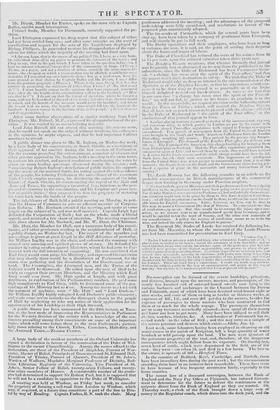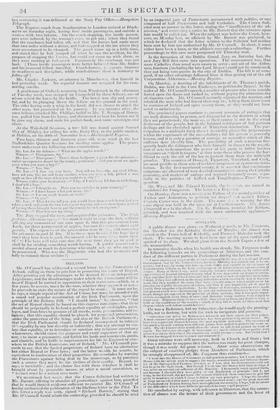No conception can be formed of the severe hardships, privations.„
and distress, brought upon the owners, masters, and passengers, of the nearly five hundred sail of outward-bound vessels now lying in the various harbours and anchorages in the Channel between the Downs and Falmouth, many of which have been detained wind-bound eight or nine weeks, and some of them so long as twelve or thirteen weeks, at expenses of Hi!., la, and even 20/. per day to the owners, besides the expense of passengers to those masters who have contracted to tind them at so much for the whole voyage. The passengers themselves are in many instances wretchedly situated—have spent all their money and know not how to get more. Many have been obliged to sell their clothes, watches, trinkets, &c. A watchmaker at Portsmouth has re- ceived watch, -, to the value of 1001.; and this may serve as a sample of the severe pressure and distress which exists.— Globe, Jan. 15.
Last week, some labourers having been employed in cleansing an old water-course in the parish of Knighton, left a large quantity of witty hemlock or wild parsnip upon the land. The men were ignorant of the poisonous properties of the root, and, therefore, of the dangerous consequences which might follow from its exposure. On Sunday last, seven head of cattle, which were depastured in the field, ate of the root . they were f ,eon taken ill, and died in a few hours. The loss to the owner, is upwards of GU—Here/bed 7'imes.
In the counties of Bedford, Kert, Cambridge, and Norfolk, there have been incendiary fires during the past week ; but the circumstances attending them have in no instance been remarkable. These fires Seetla to have become of less frequent occurrence lately, especially in the home counties.
The recent loss of a thousand sovereigns, between the Bank of England and the Navy Pay Office at Plymouth, has induced Govern- ment to determine for the future to deliver the remittances at the outports direct from the Bank of England as they are wanted. Or Thursday week, a clerk of the Bank brought down a large sum of money in the Regulator coach, which drove into the dock- yard, and the box containing it was delivered at the Navy Pay Office.—Hampshire Telegraph.
The Express coach from Southampton to London arrived at Black- water on Saturday night, having four inside passengers. and outside a women with two infants. On the coach stopping, the inside passel)_ gets were induced, by the wonnees cries. to get out ; when they found that the coachman had fallen off, mid that the horses bad come more than two wiles without a driver, and had stopped at the inn where they were accustomed to be changed. 'I he guard came up in a little time, and stated that he had jumped off when 1w saw the accident, for the purpose of stopping the horses, but could not come up with them, as they were running at fell speed. Fortunately the roachman was not burt. [These inside passengers were better-behaved than Mr. Sadler and his reverend fellow traveller. Coach-horses, it splicers, improve in steadiness and discipline, while coach-drivers show a tendency to
Mr. Charles Jackson, an attorney in Manchester, shot himself in bed yesterday week. No especial reasons are assigned for his com- mitting suicide.
A gentleman of Oxford, returning front Woodstock in the afternoon of Tuesday week, was stopped on Campsfie:Id by three fellows, one of whom seized the horse by the bridle. 'The horse was shy and power- ful, and by its plunging threw the fellow on the ground in the road. The rider having only a whip in his hand, did not choose to attack the other men, but proceeded on his journey. Iu ten minutes after, the same fellows attacked Mr. Phillips, bailiff to Mr. '1'. Knapp, of Ilanip- ton, pulled him front his horse., and threatened to beat his brains out it' he gave any alarm, and stole his pocket-book, and some sovereigns and silver.
At the Wakefield Sessions, a tree bill was found against Samuel Hey of :Whitney, for selling his wife, Betty Hey, in the public market, at Halifax, on the 30th of November last.—lludderseedd Espeess.
Two boys, thirteen and fourteen years old, were tried at the last Staffordshire Quarter Sessions for stealing some apples. The prose- cutor underwent the following cross-examination.
Mr. Lee, fur the delenee—" Vl hat are the irpples worth?"
Wituess—.. Threepence, Sit."
Mr. Lee—" Threepowe ! That's three-hallpetwe a piece for the prisoners— rather an expensive desert fur the county, gentlemen ! Did you never see apples grow when yOtt were a buy ?"
Witness—" Yes, Sir."
Mr. Lec---" I dare say vou have. Now tell me Inv goal fellow, have not you, like me :roil Many another, when you we r,• a lad, picked a nice apple or two off the trees when you could 110 it slily?" Witness (after some htsitation)—.4 Why, if I wer't say I'd dun no such thing, I shod tell a loye."
Mr. Lee—" I thought so. Three you no switches in your country.? " Witness—" I don'tkuuw what you mean, Sir." Mr. Lee —" I weau small wands, or sticks."
Witness—" 0, yes." Mr. Lee--" tell v.., you wood have done much better hail you taken stick and t; VCR the two fails a.good tlugttim and i 111,te:01 if having then' brought here to put the county to exiicuse.." Witoess—" That was not my doing."
The Jury stepped the case, and acquitted the prisoners. The .1/4::af-
fortlAire think it right tin he he•t, without
offering any comment of our own upon it, that t;.i•. ; e talon form Leek, for three pennyworth of apples, has cost tlar e• ssty about I et:ht pounds. The espial: e s of the prosecution were re. • sod votive-peg
the prisoners to gaol 11. 10s. If' to these. !lees be : . ; t he boys' lice p
since they have been in gaol, the amount will he ses „ ..se wore than 81." 'tf The boys will take care that the next time they go to gall it shall be for stealing S4 miething worth having. A puldic proseci ter is needed almost as much to determine who ought not, as who ought to be prosecuted. Who was the Alagistutte who had the assurence and folly to commit these urchins



















 Previous page
Previous page